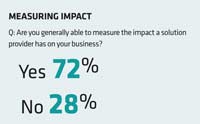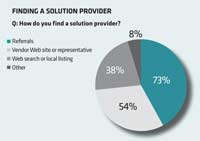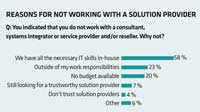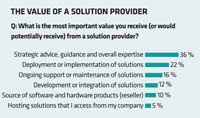In-Depth
Survey Says: Partners Matter to IT Pros
More than 2,300 customers responded to a Microsoft-sponsored survey identifying what solution provider characteristics matter most to them, and how and why they choose a partner.
- By Scott Bekker
- December 01, 2009
When it comes to IT purchasing, there's still nothing IT pros like more than having a partner in their corner, helping them to select among their myriad technology choices for a solution that meets the needs of their business.
That's not just the opinion of partners, or of the vendors who want to flatter their channel members. It's supported by the statistics in a recent survey of several thousand IT professionals and managers.
A few months ago, we talked to a number of customers and partners about what customers want and need from their partners [See "Giving Customers What They Want," September 2009]. Both groups provided critical insights, such as noting that word-of-mouth remains extremely important even as partner visibility on the Web makes a difference, and that expense matters less than value when it comes to the partner-customer relationship.
Now comes a survey of Microsoft's 400,000-member global channel by San Francisco-based Market Tools Inc. Commissioned by Microsoft, the survey was geared to help solution providers understand customer thinking as they take the software giant's most recent wave of products into the market.
"We did this to get some hard data to back up and affirm how we think about the channel and what end customers want," says Kevin McCuistion, director of partner marketing, Microsoft Core Infrastructure. To get the data, Microsoft contracted with Market Tools to survey a panel of IT professionals over the summer. There were 2,370 respondents, spread across a wide range of organization sizes and covering several job functions: IT decision maker, IT influencer, IT professionals and professional developers. According to Microsoft, the survey's respondents didn't know on which vendor's behalf they were being surveyed.
For Microsoft, the results demonstrated how important partners are to its business across all types of customers. McCuistion says, "The meta-takeaway is solution providers really do provide a lot of value in the customers' minds, and they use solution providers quite a bit."
One figure from the survey that jumped out at McCuistion was the percentage of respondents who said they worked with a partner of some type. Of IT pros -- the largest group of respondents in the survey at 71 percent -- worked with a solution provider in some capacity. IT decision makers were even more likely to work with a solution provider, and 78 percent reported doing so.
 "On advisory councils, partners always tell us that their best value is looking left to right across the business and being able to show customers an end-to-end solution. This data came back that from the customer perspective, they see it that way too."
"On advisory councils, partners always tell us that their best value is looking left to right across the business and being able to show customers an end-to-end solution. This data came back that from the customer perspective, they see it that way too."
Kevin McCuistion, Director of Partner Marketing, Microsoft Core Infrastructure
Another critical data point from McCuistion's perspective was the number that found partners' advice decisive. The survey asked, "How influential is your solution provider in the direction of your IT systems versus other sources (such as vendors, peers, publications and analysts)?" Calling solution providers "extremely" or "highly" influential were 40 percent of IT pros and 42 percent of IT decision makers.
Also of interest to Microsoft was a question about the vendor with which customers most wanted their solution providers to be aligned. Microsoft took the question over other named vendors in a landslide, with 46 percent selecting Microsoft. Although it's a Microsoft-sponsored survey and the huge gap over the next named vendor -- IBM Corp., at 13 percent -- could be taken with a grain of salt, the figures also make some sense given Microsoft's approach of pushing partners nearly exclusively as their sales force and maintaining a relatively small consulting arm. Microsoft Consulting Services accounts for less than $1 billion in revenues; in comparison, IBM Global Services generates on the order of $50 billion.
More interesting was the response to the question by organization size. For small and midsize organizations, having a solution provider aligned with Microsoft was most important: 57 percent of small organizations and 55 percent of midsize organizations valued that alignment. Microsoft alignment was less important for large organization customers, only 40 percent of which wanted solution provider alignment with Microsoft.
Attracting Customers
Many of the survey responses offer nuggets for solution providers trying to attract new customers. Microsoft's survey asked the relatively small group of respondents that didn't work with a solution provider why they declined to do so. The most common response (58 percent) among IT pros was that the company had all the necessary IT skills in-house. Interestingly, 23 percent answered that working with a solution provider was outside their work responsibilities. An additional 20 percent had no budget, while 7 percent were looking but hadn't been able to find a trustworthy solution provider. A refreshingly small 4 percent answered that they "don't trust solution providers."




[Click on image for larger view.] |
Those in the market for solution providers valued referrals above all else. A respectable 73 percent of respondents said that referrals were the way to find a solution provider, followed by vendor Web sites or representatives (54 percent) and Web search or local listings (38 percent).
Once this set of customers identifies solution providers, the biggest influences for selecting a partner are experience (75 percent), followed by business or industry knowledge, references, being local and qualifications such as vendor certification and training.
Adding Value
Those customer respondents who have settled on a solution provider cited a number of benefits from the relationship.
A key question in the survey involved customers' attitudes about the most important value they received, or could receive, from a solution provider. The key was strategic advice, guidance and overall expertise, with 36 percent of IT professionals overall choosing that option. The category was even more important to IT decision makers, 39 percent of whom valued strategic advice the most.
McCuistion says the answer makes intuitive sense, especially with Microsoft partner-customer relationships. "Microsoft provides a breadth of offerings, from desktop to data center. We know that partners are rallying around solutions with a more integrated platform approach, especially in the area of infrastructure," McCuistion explains. "On advisory councils, partners always tell us that their best value is looking left to right across the business and being able to show customers an end-to-end solution. This data came back that from the customer perspective, they see it that way too," he adds.
The next rung down on the value ladder was deployment or implementation of solutions, the survey showed, with 22 percent of respondents finding value there. That was followed in descending order by ongoing support or maintenance of solutions (16 percent), development or integration solutions (12 percent), the reseller role (10 percent) and hosted solutions (5 percent). Customers at small organizations put the comparative value in a slightly different order. Strategic advice was first at 32 percent, followed by ongoing support at 21 percent, deployment or installation of solutions at 15 percent, the reseller role at 13 percent, development or integration of solutions at 12 percent and hosting at 7 percent.
 "When I reflect over the last 12 months, really we've seen this sea change in talking to IT professionals in how they perceive their roles and what their companies are asking of them."
"When I reflect over the last 12 months, really we've seen this sea change in talking to IT professionals in how they perceive their roles and what their companies are asking of them."
Bill Laing, Vice President, Windows Server & Solutions Division, Microsoft
Taking a slightly different angle on the issue, the survey also asked IT pros to rank the value of solution providers' work in different technology areas. General advice was the most valued, with 51 percent of all IT pros in the survey saying that the area that solution providers delivered the greatest value was in overall planning, strategy and management. That was followed by system management (36 percent), storage and disaster recovery (33 percent), virtualization (30 percent), security and identity management (28 percent), application development (27 percent), business intelligence (20 percent), desktop and device management (19 percent) and branch office connectivity (11 percent).
What is the most important characteristic of a solution provider? Customers had different ideas, but the old school approach of straightforward reselling ranked way down on the list, confirming that customers expect partners to offer much more sophisticated solutions in a nuanced way. The top characteristic was "expertly implemented solutions," with 39 percent of IT pros giving that answer. That was followed by "provide expert advice and guidance for IT strategy" at 30 percent, "reduce IT costs" at 15 percent, "deliver productivity improvements" at 7 percent, "recommend and sell software and hardware" at 5 percent and "streamline business processes" at 4 percent.
That data squares with what Bill Laing, vice president of the Windows Server & Solutions Division at Microsoft, says he's been hearing from customers.
"When I reflect over the last 12 months, really we've seen this sea change in talking to IT professionals in how they perceive their roles and what their companies are asking of them," Laing says. "They're tasked with saving money and reducing cost, being more innovative in delivering solutions that their companies value, and increasing productivity."
 "For people to answer their phone, we have to be able to prove in a very short period of time that it can save money, improve efficiencies and make IT more efficient without taking two steps back for three steps forward."
"For people to answer their phone, we have to be able to prove in a very short period of time that it can save money, improve efficiencies and make IT more efficient without taking two steps back for three steps forward."
Rand Morimoto, President, Convergent Computing
When it came to reducing IT costs, customers indicated that their solution provider partners were doing a pretty good job. On a scale of one to nine for rating how much a solution provider helps save money, 38 percent of IT pros gave a strong rating of seven, eight or nine. Those at small organizations were even more likely to say solution providers saved them money, with 43 percent ranking the help between seven and nine on the scale.
Striking While the Iron Is Hot
In sum, the data from the survey tells Microsoft to keep the focus on partners, who give it a good, trusted avenue for delivering new versions of its products to customers. The survey data for partners quantifies what many already know: that customers are in need of solid, strategic advice to help them sort among technologies, especially among Microsoft's hundreds of products and tens of thousands of potential productivity-enhancing features.
Rand Morimoto, president of Convergent Computing, a Gold Certified Partner based in Oakland, Calif., sees the current wave of releases as coming at a fairly good time for partners, who can use the survey results to help inform and structure their customer conversations.
"Six months ago, nine months ago, customers were saying, 'We don't have any money,'" Morimoto notes. Two years after the recession started, budgets are tight, but customers' companies have generally stabilized and organizations are beginning to be able to justify the expense of addressing pain points that have a demonstrable effect on the business. "For people to answer their phone, we have to be able to prove in a very short period of time that it can save money, improve efficiencies and make IT more efficient without taking two steps back for three steps forward," Morimoto says.